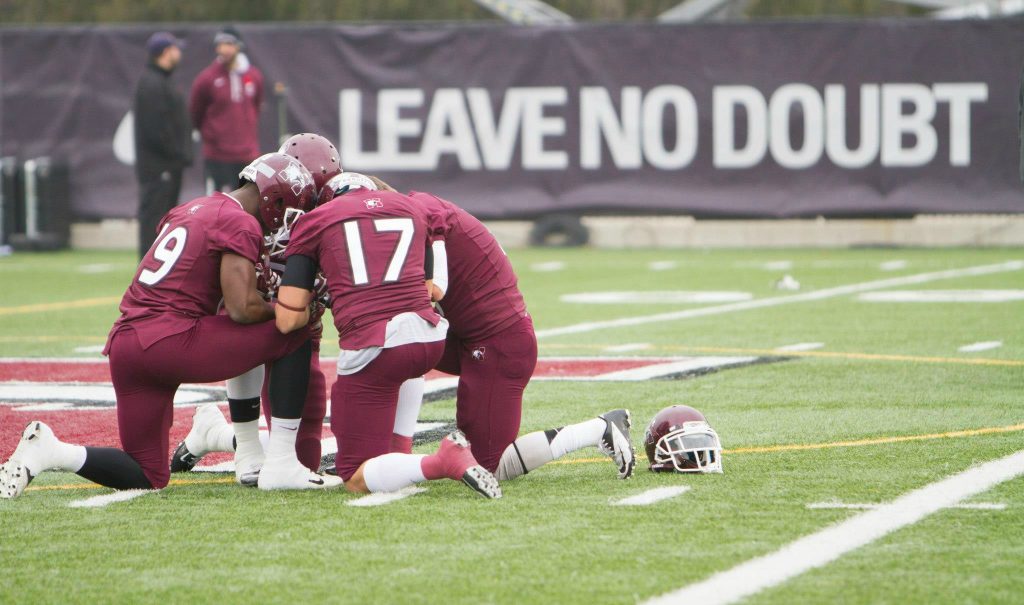Hail Mary: When sport becomes a religious experience

When it comes to creating a sense of community and shared values, high-profile sports event like the Olympics fulfil many of the same needs that religion does.
BY Sonia Verma
February 9, 2018
If you’ve ever screamed yourself hoarse watching a gold-medal game in a sport you don’t care about, or hugged strangers at a bar when your team scores, you’re familiar with the feeling that reality has been put on pause in favour of an intense, almost religious experience.
Turns out that “religious” is exactly what it is for a lot of people.
In modern society, sport — especially high-profile events like the Olympic Games or the Super Bowl — fulfils many of the same needs that religion does, says religious studies and anthropology professor Ellen Badone.
Badone, who teaches a course on sport and/as religion, offers a broad description of religion: An overarching interpretive framework that lets people see their lives as meaningful, and to overcome isolation and connect with others, and to connect with the divine. It’s a system of beliefs and practices that unite all those who share them into a single social community.
“If we take those definitions, then sport is a form of religion,” Badone says. “Sport enables both athlete and spectator to make those connections to a larger community outside the self, as religion does.” In sports, athletes also strive to break through human limits – physical and psychological – and sometimes experience a sense of almost mystical union with something greater than themselves.
Like attending a religious service, watching or playing sports unites people from different walks of life, and helps them forge a relationship under special and sometimes intense circumstances. It allows athletes to push past their natural limits and boundaries to achieve a higher plane of performance.
For spectators, sport fosters an intense sense of kinship with near-strangers – again, like congregants at a religious gathering.
That’s why, even in a room full of strangers, there is a feeling of unity, and the sense that the desires and goals within the room are bound together.
Ritual is key to sport and religion, too. The way real life grinds to a halt for the Super Bowl or the Olympics is part of what distinguishes a “sacred” ritual from mundane daily business, Badone says.
It only happens periodically, anticipation builds, and once the event starts, isolated groups find themselves drawn into the experience. Natural social barriers start to break down — strangers chat and share intense emotions, entire workplaces slow down to watch the game, bosses and employees hug when their team scores.
That communal bubbling up of feeling is called “collective effervescence,” a term coined by sociologist Emile Durkheim. He found that people within a group felt united in a more intense way when they came together once in a while for a unique experience like this.
But collective effervescence has a dark side, too, Badone warns. We see examples of its antisocial effects when a team loses and its supporters riot. “One thing communities do is demarcate insiders and outsiders,” she says. “And they can sometimes, unfortunately, react violently to those they deem outsiders,” especially after an intense loss or disappointment.
Communities — religious or otherwise — often share a tangible symbol of the thing that binds them, just as sports fans do. Think of flags at the Olympics, or team logos and mascots in the NHL and Major League Baseball. And community members’ identity becomes closely intertwined with that symbol.
The same thing happens during the Olympics, on a global scale. A national team becomes almost a proxy for the nation, Badone says. “What’s more Canadian than a player in a hockey uniform?”
So not only do we suddenly become friends with strangers at the pub, entire nations cheer for one athlete or team. And as spectators around the world watch the same event, “We have a heightened sense of belonging both to our national collectivities and to a larger global collectivity,” Badone says.
“We have a sense of belonging to humankind as a whole at the Olympics. We recognize our shared humanity.”


